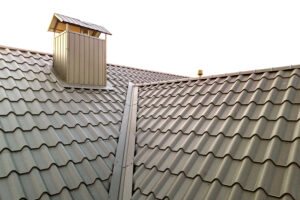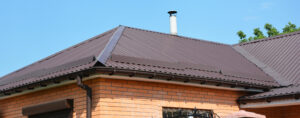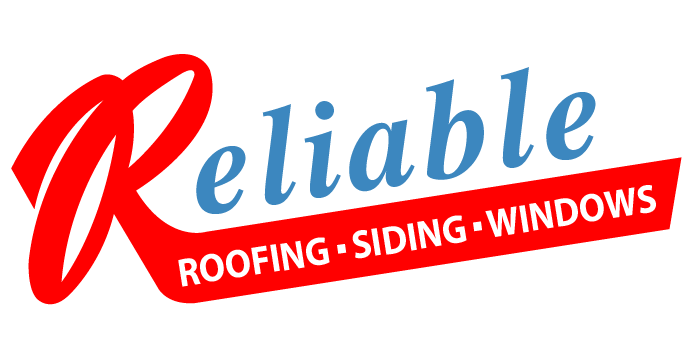Looking for a quick guide on Residential Metal Roofing? Here’s what you need to know:
- Durability: Metal roofs can easily last 40-70 years, making them more durable than traditional materials.
- Aesthetics: Available in a variety of styles and colors, metal roofing can complement any home design.
- Energy Efficiency: Reflects sunlight, reducing cooling costs and improving your home’s energy efficiency.
In the quest for a roofing option that meets both the functional and aesthetic needs of your home, you might find yourself wading through countless materials. However, one standout choice for durability, aesthetics, and energy efficiency is metal roofing. It’s not just a shelter over your head; it’s a statement of style and a smart investment in your home’s future.
Metal roofing is gaining popularity among homeowners for its remarkable longevity and minimal maintenance needs. Imagine having a roof that withstands the test of time, weather, and even fire, with little to no fuss over upkeep. That’s the durability promise metal roofing brings to the table.
But it’s not all about being tough. Your home’s roof plays a pivotal role in its overall look. Metal roofing doesn’t disappoint with its wide range of colors and styles – from sleek and modern to the traditional charm of shake or tile. It adapts to your unique taste and architecture, enhancing the curb appeal and potentially the resale value of your property.
And if reducing your carbon footprint and energy bills sounds appealing, metal roofs excel in energy efficiency. By reflecting the sun’s rays, your home stays cooler during those sweltering summer months, meaning less work for your air conditioning and more savings for you.

In short, the journey to finding the perfect roof may be daunting, but understanding the benefits of metal roofing makes the choice clear. With a blend of durability, aesthetic flexibility, and energy savings, metal roofs stand out as a wise choice for homeowners.
Understanding Metal Roofing
When we talk about residential metal roofs, we’re diving into a world of strong, long-lasting, and efficient roofing options. Let’s break it down into simpler terms to help you understand why metal might just be the perfect material for your home’s roof.
Materials
Metal roofs are not all created equal. The most common materials used include:
- Steel: Tough and treated to resist rust. It’s often coated with either zinc or a zinc-aluminum alloy to boost its resistance against corrosion.
- Aluminum: Lightweight and naturally resistant to corrosion, making it an excellent choice for homes in coastal areas.
- Copper: Offers a unique, beautiful patina over time. It’s extremely durable and lasts for decades.
- Zinc: Another durable option that’s also eco-friendly. It has a lower melting point, which makes it a bit gentler on the environment during production.
Each material has its own set of benefits, from durability to aesthetic appeal. The choice often comes down to your specific needs, preferences, and budget.
Corrosion Resistance
One of the biggest advantages of a residential metal roof is its resistance to corrosion. Thanks to modern technology, metal roofs are treated with protective coatings that fend off rust and corrosion. This means your roof can withstand harsh weather conditions—from the salty air of coastal regions to the heavy snow in colder climates—without deteriorating as quickly as other materials.
Longevity
If there’s one thing that stands out about metal roofing, it’s the longevity. A well-installed metal roof can last anywhere from 40 to 70 years, or even more. This dwarfs the lifespan of traditional asphalt shingles, which typically last between 15 to 30 years. The initial cost of a metal roof might be higher, but when you consider how long they last, the investment often pays off in the long run.
In summary, understanding the basics of residential metal roofing—from the materials used to the built-in corrosion resistance and impressive longevity—can help you see why it’s an excellent choice for your home. With a metal roof, you’re not just protecting your house from the elements; you’re making a smart, long-term investment in your home’s future.
Common Problems with Metal Roofs
While residential metal roofs have many advantages, like any roofing material, they are not without their potential issues. Understanding these common problems can help you make an informed decision and maintain your roof effectively over its lifespan.
Leaks: Yes, even metal roofs can leak. This usually happens around the screws and at the seams where panels meet. If not installed correctly, water can find its way in. Regular inspections can catch and fix these leaks early.
Corrosion: Although metal roofs are designed to resist corrosion, certain environments or improper installation can lead to rust. Choosing the right type of metal and finish, like the Alunar® Coating System, can significantly reduce this risk.
Denting: Hail or falling debris can dent a metal roof. Some metals are more resistant to denting than others. For example, aluminum is softer and more prone to denting than steel. However, many homeowners find that the occasional dent doesn’t detract from the roof’s performance.
Noise: During a heavy rain or hailstorm, metal roofs can be noisier than other types. Proper insulation and attic space can minimize this issue, making it a non-problem for most homeowners.
Expansion and Contraction: Metal expands and contracts as it heats and cools, which can loosen fasteners and create gaps in the roofing over time. Experienced installers can account for this with proper installation techniques.
Mismatched Repairs: If repairs are needed, finding an exact color match can be challenging, especially as colors fade over time. Working with a reputable contractor who has access to original materials can help ensure a closer match.
Despite these potential issues, the benefits of a metal roof often outweigh the cons. With proper installation, maintenance, and occasional repairs, a metal roof can protect your home beautifully for decades to come. Choosing experienced architects and contractors with a track record in residential metal roofing can significantly mitigate these common problems, ensuring your roof performs at its best throughout its lifetime.
Types of Residential Metal Roofing
When you’re considering a residential metal roof, it’s like picking out a new car. You’ve got a variety of models (or in this case, types) to choose from, each with its own set of features and benefits. Let’s dive into the main styles you’ll come across:
Standing Seam
Think of standing seam roofs as the sleek, modern sports car of metal roofing. This type features long, continuous panels that run from the ridge of the roof all the way down to the eaves. The seams between panels are raised above the level of the roofing itself, which is where it gets its name. Why are they great? Well, those raised seams mean fewer opportunities for water to sneak through. Plus, they give any home a sharp, distinct look.
Exposed Fastener Panels
These are more like your reliable family sedan – economical and practical. Exposed fastener panels are straightforward: the metal panels overlap, and screws (or fasteners) go right through the panel into the roof deck. They’re called “exposed” because you can see the head of the screw. To keep things looking neat, those screw heads are often painted to match the panels. Why pick this one? It’s generally less expensive than standing seam and simpler to install.
Interlock Systems
Interlock roofing systems are akin to the all-wheel-drive vehicles of the roofing world. They lock together on all sides, which offers excellent protection against the elements. They’re designed to be incredibly durable, and because the panels interlock, they’re less likely to be lifted by strong winds. The cool part? They can mimic the look of traditional roofing materials like slate or cedar shingles.
Slate, Cedar Shingle, Shake, Mediterranean Tile
Now, if standing seam is the sports car and exposed fastener panels are the family sedan, then these options are the classic cars – they never go out of style. Metal roofing can be crafted to look just like slate, cedar shingles, shake, or Mediterranean tiles. Why go for these? You get the timeless look of these materials but with the longevity and durability of metal. It’s like having your cake and eating it too.
In choosing the type of residential metal roof, consider what’s important for you. Is it the sleek appearance of standing seam, the cost-efficiency of exposed fastener panels, the durability of interlock systems, or the traditional look of slate or cedar? Each has its own set of advantages, and the right choice depends on your specific needs and preferences.
We’ll explore how these roofing options stand up to installation and maintenance, how they can save you money in the long run, and why they might just be the perfect fit for your home, especially in challenging climates.
.
Installation and Maintenance
When considering a residential metal roof, understanding the installation and maintenance requirements is crucial. Let’s dive into what you need to know about skill and labor, installing over existing shingles, cleaning and inspection, energy efficiency, and the Alunar® Coating System.
Skill and Labor
Installing a metal roof is not a DIY project for most homeowners. It requires a specific set of skills and knowledge that professional roofers bring to the table. The right contractor will have experience with metal roofing systems and understand how to handle the materials to avoid damage during installation. They will also be familiar with local building codes and requirements. Choosing an experienced contractor ensures your roof is installed correctly and lasts for decades.
Over Existing Shingles
One of the advantages of metal roofing is its lightweight nature, which in many cases allows it to be installed directly over existing shingles. This can save time and disposal costs. However, it’s important that a professional assesses the structure of your current roof to ensure it can support the new metal roof and to identify any areas that may need repairs before installation.
Cleaning and Inspection
Maintenance for a metal roof is relatively low compared to traditional roofing materials. However, regular cleaning and inspection are still important. Keeping the roof free of debris, such as leaves and branches, can prevent moisture retention and corrosion. It’s also wise to inspect your roof after severe weather events for any signs of damage. Professional inspections are recommended at least once a year to ensure the integrity of your roof.
Energy Efficiency
Metal roofs are highly energy-efficient. They reflect solar radiant heat away from your home, which can reduce cooling costs by up to 25%. The Alunar® Coating System enhances this benefit with its cool roof pigment technology. This not only contributes to lower energy bills but also to a more comfortable living environment inside your home.
Alunar® Coating System
The Alunar® Coating System is designed to protect your metal roof from the elements. It incorporates a unique blend of acrylic and polyvinylidene fluoride (PVDF), providing outstanding color stability, gloss retention, and resistance to abrasion, scratching, and chemicals. This coating is especially beneficial in coastal environments, where salt spray can cause corrosion. Additionally, the infrared (IR) reflective pigments comply with industry energy conservation initiatives, further enhancing the energy efficiency of your metal roof.
By understanding the installation and maintenance requirements of a metal roof, homeowners can ensure their investment is protected and lasts for many years. With the right care, a metal roof can provide durable, energy-efficient, and aesthetically pleasing coverage for your home. The success of your metal roofing system heavily relies on professional installation and regular maintenance.
As we move into the cost comparison between metal roofs and traditional shingles, keep in mind the long-term savings and benefits that a metal roof offers, especially in terms of energy efficiency and lifespan.
Cost Comparison: Metal Roof vs. Shingles
When thinking about a new roof, cost is often the first thing that comes to mind. Let’s break down the cost comparison between residential metal roofs and traditional shingles. We’ll look at upfront costs, long-term savings, energy efficiency, and lifespan to give you a clear picture.
Upfront Cost
Metal Roofs: Initially, metal roofs are more expensive. This is because the materials themselves are pricier, and the installation requires specialized skills. However, this is just the beginning of the story.
Shingles: Asphalt shingles are less expensive upfront. They are widely available and easier to install, which keeps initial costs lower.
Long-term Savings
Metal Roofs: The initial investment in a metal roof pays off over time. Metal roofs require less maintenance and have fewer repair needs. Plus, if you’re in an area prone to severe weather, a metal roof can withstand a lot without needing replacement or repair.
Shingles: While cheaper at first, shingles may need to be replaced or repaired more often, especially after harsh weather. These costs add up over time, making shingles potentially more expensive in the long run.
Energy Efficiency
Metal Roofs: Metal roofs are champions of energy efficiency. They reflect sunlight, keeping your home cooler in summer. This can save up to 25% on cooling costs. Some metal roofs come with special coatings, like the Alunar® Coating System, further enhancing their energy efficiency.
Shingles: Traditional shingles absorb sunlight, which can increase your home’s temperature. This means your air conditioning works harder, increasing your energy bills during warm months.
Lifespan
Metal Roofs: Metal roofs shine when it comes to lifespan. They can last 40-70 years or more, with some materials like zinc and copper lasting over 100 years. This durability means you might never have to replace your roof again.
Shingles: The lifespan of asphalt shingles is shorter, typically 15-30 years. This means you may have to replace a shingle roof two or even three times while a metal roof is still going strong.
In summary, while metal roofs have a higher upfront cost, their long-term savings, energy efficiency, and extended lifespan make them a cost-effective choice for many homeowners. A metal roof is not just a purchase; it’s an investment in your home’s future. As we consider the specific benefits that metal roofing offers, especially in challenging climates, the value becomes even clearer.
Benefits of Metal Roofing in Specific Climates
When we zoom in on the benefits of residential metal roofing in specific climates, the advantages shine even brighter. Let’s break down why metal roofing stands out, particularly focusing on Chicago durability, weather resistance, solar compatibility, and cool roof technology.
Chicago Durability
Chicago is known for its harsh winters and intense storms. A residential metal roof is built to withstand these extreme conditions. Unlike traditional roofing materials that may crack, erode, or blow away under heavy snow, ice, or wind, metal roofing remains steadfast. Its lightweight nature also means it can be installed over existing roofs without adding undue stress to your home’s structure, saving both time and money.
Weather Resistance
Weather resistance is a hallmark of metal roofing. Whether it’s resisting hail in the Midwest or standing strong against coastal storms, metal roofs are designed to protect your home. Their interlocking panels provide an added layer of defense against water intrusion, a common concern in areas prone to heavy rains. Plus, metal roofs are fire-resistant, offering peace of mind during wildfire season.
Solar Compatibility
In today’s eco-conscious world, many homeowners are looking to solar power as a way to reduce their energy footprint. Metal roofs are uniquely suited for this, thanks to their solar compatibility. Homeowners can easily install solar panels on metal roofs without compromising the roof’s integrity. Moreover, metal roofs can enhance the efficiency of solar panels. Their reflective nature can keep the roof (and thus the solar panels) cooler, potentially increasing the panels’ efficiency on hot days.
Cool Roof Technology
One of the most compelling features of modern metal roofing is its cool roof technology. Thanks to innovative coatings, such as the Alunar® Coating System, metal roofs can reflect more sunlight and absorb less heat than traditional roofs. This means less heat is transferred into your home, leading to significant savings on cooling costs. In climates where the sun beats down relentlessly, a cool metal roof can be a game-changer for your comfort and your wallet.
By embracing residential metal roofing, homeowners in Chicago and similar climates can enjoy a host of benefits. From unparalleled durability against harsh weather to the energy savings offered by solar compatibility and cool roof technology, metal roofs stand out as a smart, sustainable choice. Consider how a metal roof could not only protect your home but also enhance its efficiency and curb appeal.

Frequently Asked Questions about Residential Metal Roofing
When considering a residential metal roof, it’s natural to have questions. Here are some of the most common queries homeowners have, answered in simple terms.
What is the biggest problem with metal roofs?
The biggest challenge with metal roofs can be condensation. If not properly installed with adequate ventilation and insulation, moisture can accumulate beneath the metal panels, leading to potential issues inside your home. However, with professional installation, this problem is easily avoided.
Is it cheaper to put a metal roof or shingles?
Initially, metal roofs are more expensive than shingles. The materials and labor for installing a metal roof can cost more upfront. But, it’s important to consider the long-term savings. Metal roofs last significantly longer (30-50+ years) and can save on energy bills due to their reflective properties. Over time, a metal roof can be a more cost-effective choice.
Does a metal roof affect WiFi?
This is a common concern, but in most cases, a metal roof does not significantly impact WiFi. Modern home WiFi systems are powerful enough to maintain strong signals. If you experience issues, solutions like additional access points or a mesh network can enhance your home’s WiFi coverage.
The key to a successful residential metal roof is choosing the right contractor with experience in metal roofing installations. Properly installed, a metal roof offers unmatched durability, energy efficiency, and beauty for your home. As we wrap up, keep these answers in mind and consider how a metal roof fits into your home improvement plans.
Conclusion
As we conclude our ultimate guide to residential metal roofing options, highlight why choosing Reliable Roofing for your roofing needs is a decision that offers peace of mind and lasting value. Our family-owned business brings over 20 years of experience to the table, ensuring that every residential metal roof we install meets the highest standards of quality and craftsmanship.
Reliable Roofing stands out in the industry not just for our expertise but also for our commitment to providing reliable warranties that protect your investment for years to come. We understand that a roof is more than just a part of your home; it’s a critical component that protects your family and your possessions. That’s why we offer comprehensive warranties that cover material and labor, giving you confidence in the durability and longevity of your roof.
Our team of professionals is dedicated to ensuring that your experience with us is seamless from start to finish. From the initial consultation to the final inspection, we work closely with you to understand your needs and preferences, guiding you through the selection process to find the perfect metal roofing option for your home.
With our extensive experience, we’ve seen the benefits that a metal roof can offer, from unparalleled durability in harsh weather conditions to significant energy savings thanks to the reflective properties of metal roofing materials. Our commitment to using only the highest quality materials means that your roof will not only look great but also perform exceptionally for decades.
Choosing Reliable Roofing means partnering with a contractor who values integrity, quality, and customer satisfaction above all else. We’re not just installing a roof; we’re building a relationship based on trust and excellence. Our family-owned business takes pride in enhancing the protection, appearance, and value of your home, ensuring that your metal roofing investment is well-placed.
For those considering a residential metal roof, we invite you to explore our metal roofing materials and services. Discover the difference that quality, experience, and a commitment to customer satisfaction can make. At Reliable Roofing, we’re not just roofing experts; we’re your partners in making your home safer, more energy-efficient, and more beautiful.



